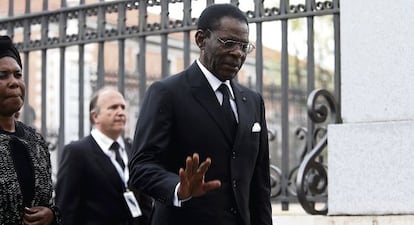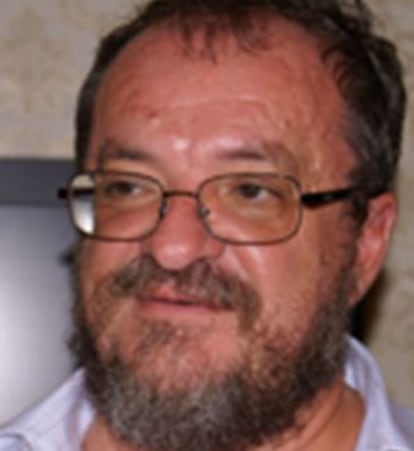The long hunt for the Kokorevs
Russians held in Panama alleged to have laundered millions for Equatorial Guinea leader The pair had unsuccessfully tried to take EL PAÍS to court to halt its investigations


The Kokorevs’ long adventure is over. After living on a knife edge for three whole decades, Vladimir, 59, Julia, 61, and their eldest son Igor were arrested in Panama after fleeing their Madrid home in 2012, just as the police were going to move in on them.
The three members of this Russian family are now in prison, charged with laundering $30 million on behalf of Teodoro Obiang, the longtime dictator of the small, oil-rich West African nation of Equatorial Guinea.
The police described the Kokorevs as “frontmen for high-level Equatorial Guinea politicians who divert public funds”
Authorities are now looking for the youngest son, Vladimir, who is believed to be hiding in the United States.
The judiciary police of Las Palmas described the Kokorevs as “frontmen for high-level politicians from Equatorial Guinea who divert public funds.”
The international arrest warrant was issued by a Spanish judge in Las Palmas de Gran Canaria following a long investigation, sources familiar with the case told EL PAÍS. Progress was hindered by the complexity of the case and by the slow pace of the justice system.
The Spanish anti-corruption attorney’s office had been monitoring the Kokorevs for years, yet the latter were able to flee their €1.7 million home on Madrid’s Pintor Rosales street before being nabbed. Sources at the Anti-corruption Attorney’s office are convinced that the Kokorevs were tipped off.
“I don’t know where the lady and gentlemen went to,” says the building doorman mistrustfully.
The police had been aware for over two years that the Kokorevs had taken refuge in Panama, judicial sources said. In October of last year, the judiciary police’s monetary crimes unit asked Judge Ana Isabel Vega, of the Las Palmas court, to issue an arrest warrant against all four family members, EL PAÍS has confirmed.
But the order was issued 11 months later, in August of this year. At the Madrid Anti-corruption Attorney’s Office, some find it hard to conceal their “amazement” at the foot-dragging by a judge who has had a damning Tax Agency report against the Kokorevs on her desk for over a year.
So what happened?
“Obiang and his ministers show up in this case. That’s what happened,” said one investigator, speaking on condition of anonymity.
The slow pace of the justice system helped the Kokorevs get out of Spain, where they have numerous properties to their name. Vladimir and Julia Kokorev also have several Spanish bank accounts that were used to transfer, and allegedly launder, around $30 million. The real owners of this fortune are politicians from the Mongomo clan, made up of Teodoro Obiang and his family, according to several reports by the judiciary police.
Before skipping the country, the Russian couple filed criminal charges against EL PAÍS in a bid to stop this newspaper’s five-year investigation into their activities and into their extensive business network, which they used to make transactions in several tax havens. The court case has since been dismissed.
Dragging on since 2003
The investigation into the Kokorevs was started in 2003 by the Bank of Spain’s Money Laundering Prevention Unit.
After receiving a damning report from the Spanish Tax Agency, which also found evidence of tax fraud by the Kokorevs, anti-corruption attorney Luis del Río Montes de Oca asked Judge Ana Isabel Vega, of the Las Palmas court, to make them official suspects in a money-laundering and tax-fraud probe.
The cornerstone of the investigation was Kalunga Company SA, a Panamanian firm owned by the Kokorevs. According to police reports, between 2000 and 2003 this company was the beneficiary of 13 transfers worth a combined $26.4 million. The money came out of an account held by Equatorial Guinea’s state oil company at Riggs Bank in New York. The recipient account was opened by the Kokorevs at a Santander branch in Las Palmas.

The New York account, in turn, received $700 million from the US oil companies Marathon and Exxon Mobil. The individuals with signing authority on this account were President Teodoro Obiang, his son Gabriel and Melchor Esono Edjo, his nephew and former treasury minister.
A 2004 US Senate investigation known as the Riggs Bank Report determined that “Riggs Bank serviced the Equatorial Guinea accounts with little or no attention to the bank’s anti-money-laundering obligations, turned a blind eye to evidence suggesting the bank was handling the proceeds of foreign corruption, and allowed numerous suspicious transactions to take place without notifying law enforcement.”
This report also found that Riggs facilitated the creation of front companies by the Obiangs. Meanwhile, another report by Spanish judiciary police established that the Kokorevs’ company in Panama “could be acting as an intermediary to channel inflows and outflows by the Government of the Republic of Equatorial Guinea.”
The slow pace of the justice system helped the Kokorevs get out of Spain, where they have numerous properties to their name
The Russian couple were brought before anti-corruption attorney Del Río as part of the preliminary investigation, and questioned about the $26.4 million. The Kokorevs – who claim to be a history teacher and a journalist – said that the Obiangs paid them that amount for their fishing activities. But the police noted that the fishing vessels allegedly owned by the couple “are unknown to Spanish customs agencies.”
“Do you know President Teodoro Obiang?” Del Río asked Vladimir Kokorev during that preliminary phase of the the investigation, over a decade ago now.
“I met him during my period as a civil servant in the Soviet Union,” was the reply. “I met the leaders of Equatorial Guinea in my position as advisor to the Communist Party’s international department. I never had a relationship with the government leaders, just with the presidency, but not with physical persons.”
Meanwhile, Julia Kokoreva introduced herself as an interpreter in Latin America, the USSR and Africa, and a journalist for “an independent newspaper” during the Perestroika era.
Investing in real estate
Another link between the Kokorevs and the Obiangs is the fact that several Spanish properties – apartments, stand-alone houses and parking spaces – were purchased under the Guinean leader’s name or that of his relatives, ministers and other high-ranking officials, precisely at the same time when the Kokorevs were receiving their 13 transfers at Santander bank, according to the police report.
In 2008, the Pro-Human Rights Association of Spain filed a criminal complaint against Obiang, his ministers and his relatives for allegedly using Equatorial Guinea’s oil revenues to make real estate purchases in Las Palmas, Madrid, Alcalá de Henares and Gijón (Asturias).
The Spanish connection
Equatorial Guinea was granted independence from Spain in 1968. Teodoro Obiang has been in power since 1979, after he ousted his own uncle in a coup. His regime is routinely criticized by international organizations for its gross violation of human rights and civil liberties.
Despite being a major oil producer with the highest per capita income in all of Africa, a majority of the population lives in poverty and many have no access to basic infrastructure such as clean drinking water.
The investigation has concluded that the Kokorevs’ Spanish accounts sent money to several of Obiang’s relatives and ministers. One of these was Melchor Esono Edjo, Obiang’s nephew and former treasury minister for 18 years. A police report stated that “there is no reasonable explanation” for the fact that he received €200,000 from the Kokorevs in Luxembourg and that in 2003 he withdrew €500,000 in a single transaction.
Fausto Abeso Fuma, Obiang’s son-in-law and the new aviation minister, also received $2 million from the Kokorevs in seven transfers to banks in Madrid, Paris and Geneva.
The Kokorevs hightailed it out of Madrid just weeks after a meeting in which French judges and attorneys convinced their Spanish counterparts that their money-laundering case was solid. The French legal experts also noted that their own justice system already brought action against Obiang’s son Teodorín in 2012 and seized his Paris palace, his artwork and his collection of luxury cars over another money-laundering case. Since 2011, US authorities have also been working to seize Teodorín’s assets there, which are believe to derive from extortion, embezzlement and other criminal activities.
The investigation has concluded that the Kokorevs’ Spanish accounts sent money to several of Obiang’s relatives and ministers
At that high-powered judiciary meeting, several Spanish businesspeople who suffered extortion from Teodorín back in Equatorial Guinea gave depositions.
The Spaniards were convinced. The police raid was prepared, and the Kokorevs’ home on Pintor Rosales placed under surveillance. But Vladimir and his wife had already flown the coop, taking the former’s father along with them.
After landing in Panama, the couple began slowly selling off their Spanish properties. According to an investigation by EL PAÍS and another one by the judiciary police, before leaving Spain the Kokorevs had three apartments in Madrid and three more in Las Palmas worth a combined €2.5 million. In 2006, their company Phase Invest SL purchased 25 apartments at the Sands Beach Resort in Lanzarote for €4.8 million. The “journalist” and the “history teacher” also owned 10 companies in several tax havens.
English version by Susana Urra.
Tu suscripción se está usando en otro dispositivo
¿Quieres añadir otro usuario a tu suscripción?
Si continúas leyendo en este dispositivo, no se podrá leer en el otro.
FlechaTu suscripción se está usando en otro dispositivo y solo puedes acceder a EL PAÍS desde un dispositivo a la vez.
Si quieres compartir tu cuenta, cambia tu suscripción a la modalidad Premium, así podrás añadir otro usuario. Cada uno accederá con su propia cuenta de email, lo que os permitirá personalizar vuestra experiencia en EL PAÍS.
¿Tienes una suscripción de empresa? Accede aquí para contratar más cuentas.
En el caso de no saber quién está usando tu cuenta, te recomendamos cambiar tu contraseña aquí.
Si decides continuar compartiendo tu cuenta, este mensaje se mostrará en tu dispositivo y en el de la otra persona que está usando tu cuenta de forma indefinida, afectando a tu experiencia de lectura. Puedes consultar aquí los términos y condiciones de la suscripción digital.








































